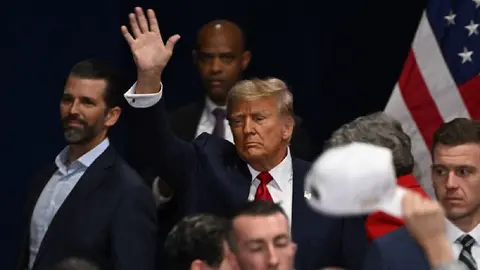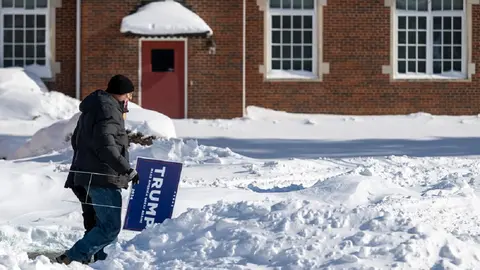Who's afraid of Donald Trump?

Throughout the centuries that have been part of history there have always been characters whose ambition and unhealthy narcissism have ended up phagocytising everything around them. They even feel themselves to be above the government, institutions, power, the state and, in time, democracy.
They are the ones who believe they are predestined to be the saviours of a mass lost among scum, gloom, violence, disenchantment, betrayal and weariness. They believe that their presence alone will be enough to solve all problems, although in reality their solutions only complicate them further because they always tend to polarise: they cater to the minorities and subjugate the majorities.
The closest historical reference to our memory, in terms of consummated disaster, is the personality of Adolf Hitler who dragged countries into a Second World War and brought about destruction that no one saw coming. Paul von Hindenburg himself, then President of Germany, appointed Hitler Chancellor of Germany believing that his ambitions were limited. Hindenburg was wrong.
Just as British Prime Minister Arthur Neville Chamberlain was wrong to sign the Munich Agreements that ended up ceding to Hitler the Sudetenland, which had belonged to Czechoslovakia and passed into German hands after several secessionist and pro-German movements. And the attack by the German Army that came to the support of the Sudeten Germans. Chamberlain endorsed Hitler's appropriation of 30,000 square kilometres of Czechoslovakia, thinking that this would leave the wolf happy and with no further aspirations in the region. Another historical mistake.
Wars and battles throughout human history are full of historical mistakes. There is no ifs and buts. All that remains the next day is to clean up the mess.
While Vladimir Putin is currently the figure most often compared in the West to Hitler's personality and his territorial and supremacist ambitions, there is another figure who is not going unnoticed by many analysts in the United States and Europe: Donald Trump.
The Trump who has said of himself that he would be dictator for a day. The same one who has flirted with Putin or Kim Jong-un and who feels smarter than the rest, be they judges, legislators or civil servants.
The same one who uses his media personality and his popularity on social networks to harangue against the system, against justice, and does so to hate more and to divide more; to confront and to resurrect old hatreds against blacks, immigrants, homosexuals... against everything that is not white and pretty because for the tycoon that is what best represents the American spirit: being white, blond and pretty.
Not only in his presidency, but as a losing candidate in an election, he has shown his dangerous potential because he has a narcissistic, ambitious, egotistical, arrogant personality and is a sore loser. Trump feels he is above democracy, institutions and the "establishment".
He has already given a warning of how far he is capable of going. The assault on the Capitol is not trivial, nor can it be ruled out that it will happen again or worse because an angry mob intends to take to the streets or the institutions because Trump, prevented by justice or the ballot box, cannot return to the White House.
On the subject
Trump has even threatened to create his own party and consequently weaken the Republican Party; aware of this risk because no one has the popularity of the former president within the Republican ranks, Governor Ron de Santis decided to get off the primary bandwagon. Inside the Republican Party they are afraid of this monster that is getting bigger, more voracious and threatening. But they have no other choice, they will give him the nomination.
The creation of a new "Trump-style" political party would weaken the traditional American bipartisanship at a time when polarisation is growing more than ever. Once again the eternal clash of ideas between North and South has resurfaced and the ghosts of the past have returned. Families are coming to blows over politics: some for Biden, some for Trump.
How far can Trump go to return to power? There are many reports and analyses both in the United States and in Europe that warn of a very adverse social, political and emotional climate within the American Union that could lead, at some point in time, to civil war.
I bring up Stephen Marche who published in The Guardian why he believes that there will be a civil war in the United States sooner or later, citing structural political problems and a long-standing crisis.
Marche points out that the legal system is becoming less legitimate by the day. Trust in government at all levels is in free fall or, like Congress, with approval ratings hovering around 20 per cent, cannot fall any lower.
According to Marche: "America has burned before. The Vietnam War, the civil rights protests, the JFK assassination, Watergate, all were national catastrophes that remain in living memory. But the United States has never faced an institutional crisis like the one it faces now. Confidence in institutions was far greater during the 1960s. The Civil Rights Act enjoyed broad bipartisan support. JFK's assassination was collectively mourned as a national tragedy. The Watergate scandal, in retrospect, was proof that the system worked. The press reported presidential crimes; Americans took the press seriously. Political parties felt they had to respond to allegations of corruption".
Today, in the American Union, what persists is a terrible crisis of confidence, there persists enormous disquiet and people are hungry for answers... people like Trump give that audience what they want to hear and if they don't get what they want, they will simply go for it with all their destructive anger. Who's afraid of Donald Trump?



